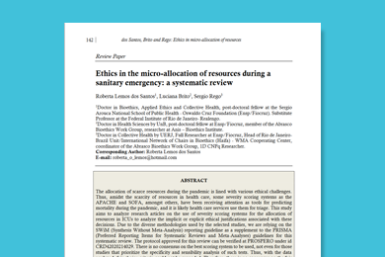
The allocation of scarce resources during the pandemic is lined with various ethical challenges. Thus, amidst the scarcity of resources in health care, some severity scoring systems as the APACHE and SOFA, amongst others, have been receiving attention as tools for predicting mortality during the pandemic, and it is likely health care services use them for triage. This study aims to analyze research articles on the use of severity scoring systems for the allocation of resources in ICUs to analyze the implicit or explicit ethical justifications associated with these decisions. Due to the diverse methodologies used by the selected studies, we are relying on the SWiM (Synthesis Without Meta-Analysis) reporting guideline as a supplement to the PRISMA (Preferred Reporting Items for Systematic Reviews and Meta-Analyses) guidelines for this systematic review. The protocol approved for this review can be verified at PROSPERO under id CRD42020214029. There is no consensus on the best scoring system to be used, not even for those studies that prioritize the specificity and sensibility analysis of such tests. Thus, with the data analyzed, fair-choice criteria could not be grounded. Therefore, there is no consensus on the fair distribution of scarce health care resources based on equity. This will also be reflected during sanitary emergencies. We defend the participation of communities that will be directly affected by such allocation in validating the possible consensus and implementing this consensus as impartially and fairly as possible.